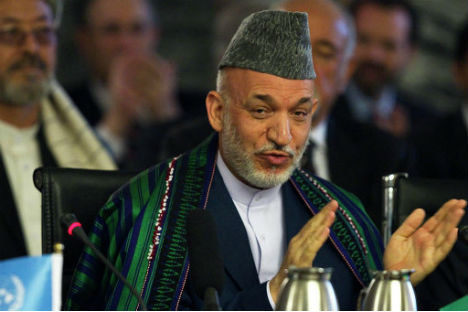
Hamid Karzai. Source: Reuters
“Security is an issue that is not related to us alone… Had it been an Afghan issue, the Americans would have never come here – as they didn’t before September 11 [2001],” Karzai said, speaking to journalists from RIA Novosti, the Rossiya24 and Russia Today television channels in Kabul.
“It’s a Pakistan issue, it’s a neighbors’ issue, it’s the Western attitude’s issue, it’s Russia’s issue, it’s China’s issue, it’s India’s issue as well. It’s an Iranian issue,” he said.
Therefore, he added, “when we speak of security… for individual Afghans in terms of law and order – it is an Afghan issue. But when we speak of security for Afghanistan in terms of terrorism and the War on Terror, it isn’t an Afghan issue: it is a collective issue of the international community, in which the international community has not done as well as it promised."
Earlier this month, Karzai and U.S. President Barack Obama signed a strategic partnership agreement outlining the U.S.-Afghan relationship over a decade following the planned withdrawal of NATO troops from the war-torn country in 2014
What’s after 2014?
When asked what kind of presence foreign troops would have in Afghanistan after 2014, Karzai said this was to be defined in an additional U.S.-Afghan agreement to be signed within a year.
There should be a “continuity of the U.S. presence in Afghanistan in a manner – much smaller, but in a manner between the two countries, and in relation to the overall struggle against terrorism,” he said.
He agreed that the security situation in the country was poor despite more than a decade of U.S. and NATO presence, but argued that “great achievements” have been done in terms “overall development of the country,”including education, health services, roads, as well as the economy, particularly the value of the Afghan currency, which currently trades at about 50 Afghanis per dollar.
The Afghan economy is heavily dependent on foreign aid, with the United States being the largest contributor. The U.S.-Afghan strategic agreement does not spell out the levels of U.S. aid to Afghanistan beyond 2014, but estimates stand at about $4 billion just on support for the Afghan security forces, with billions more to be spent on governance and development.
Observers have expressed concerns that the expected decrease in foreign assistance after 2014 may send Afghanistan’s economy into a deep recession.
Karzai said Afghan income per capita currently stands at $700 because of the international assistance, compared to $180 in 2002. The withdrawal of the international forces “will have an impact, no doubt, economically,” he said.
However, he insisted that “the overall effect of the withdrawal of these forces will be good on the Afghan people and the Afghan economy. We have to live by our means. We cannot depend for the whole of our life on others.”
He expressed confidence that by 2024, when the U.S.-Afghan agreement expires, Afghanistan’s annual revenues would stand at $5 billion, if compared to the current level of $2 billion.
Who is U.S. fighting in Afghanistan?
Karzai also said that in fighting terrorism in his country, one should differentiate between real “terrorists” and most of the Taliban and former Mujahedeen supporters whom he described as “my brothers.”
“Those Taliban who are part of Al-Qaeda, who are part of terrorist networks, who are part of intelligence outfits working against the Afghan people are definitely terrorists,” he said.
“But the majority of them, who’ve been driven out of their homes, out of their country by circumstances, not in their hands – they are not terrorists. They are aggrieved, and they must be brought back, and they must be settled in their country,” he said, adding: “So, the answer is: those who commit terrorism are terrorists, those who do not commit terrorism are not.”
He also criticized the use of the word “insurgency” by U.S. and NATO commanders in Afghanistan in regard to those fighting his government.
“We disagree to that, completely,” he said, adding that using such a term to describe Afghan militants would mean that “the international community is taking up a gun against one Afghan in favor of another Afghan,” which he said would be viewed as “interference” in Afghanistan’s domestic affairs.
“We call it the War on Terror, or the struggle against terrorism,” he added.
All rights reserved by Rossiyskaya Gazeta.
Subscribe
to our newsletter!
Get the week's best stories straight to your inbox